- Home
- Pip Ballantine
Thrilling Tales of the Ministry of Peculiar Occurrences Page 16
Thrilling Tales of the Ministry of Peculiar Occurrences Read online
Page 16
But, as fire was like to do, it caught. First a spark, lighting something long-dormant inside him, limning the edges to a hot orange glow. Then it flickered to life in his chest, a soft candle illuminating an empty, disused chamber, sealed tight as a tomb. He stretched out his left arm and checked the watertight compartment for a new cartridge, waving away the steam before he pulled it out.
Watertight.
He glanced up, seeing the first mikoshi already reaching the far shore, where thousands of unsuspecting men and women waited for the parade. Without the tama to turn off the bomb, they would have to stop it another way.
“I’ve either a plan or a death wish,” he said. He snapped the magazine into place, tugged the loading lever back, and swung himself in the saddle. “Time to find out which.”
Tokiko nodded and drew her wakazashi, turning back to the skirmish now leaning in the Shinsengumi’s favor. “Forgive me if I do not wish you Godspeed.”
Law tipped his bowler and spurred Brutus. The groups carrying mikoshi moved slowly, their walk a rhythmic dipping gate, bouncing the shrine up and down like a stagecoach over uneven ground. Law and Brutus drummed the planks toward them, and caught up just as the final mikoshi reached the bridge’s centre. The men were turning around, scrambling and staggering to clear a path on the bridge without dropping the elaborate shrines.
Where was the phoenix mikoshi? Law stood in his stirrups, hot wind whipped past his face as Brutus surged down the line. Then he saw it—the intricate carving atop the second-to-last mikoshi. It was burnished to a high sheen, but the lid’s wood was newer, brighter than the rest. He whistled, sending Brutus into an immediate lunge to the right, heading off the mikoshi.
He drove the bearers sideways on the bridge, and the men holding the two rear mikoshi seemed to think better of trying to cross the mad Englishman armed with the horse and gun, turned to flee back the way they had come. These were normal tradesmen, not samurai. He drove them back, cursing his poor Japanese as he shouted vague orders they didn’t seem to understand. He wasn’t sure how to tell them there was a bomb, couldn’t impress on them his desire to save them, not hurt them. Treating these people like sheep wouldn’t do much for peaceful relations, but the only way to get them where he wanted was to herd them.
They reached the centre of the bridge just as the mikoshi began to smoke. The bearers shouted in alarm, half letting go and scrambling away from the shrine, which now ticked loud enough to hear over the drums and shouts. He dismounted and swatted Brutus. As hoof beats retreated, he grabbed a pole, tugging it toward the railing.
“In the bleedin’ water!” he shouted. The men resisted him, shouting and arguing at each other in Japanese, their dialect so thick his limited grasp of language failed to help. He caught the nearest man’s gaze and paused, wishing he could explain that he was trying to help. They looked at each other for a beat, and the man stopped struggling away from him. Something in the man’s dark eyes shifted, opened, and Law was looking at a person. Not just a part of the crowd, but another human being with as long a history as his own. Perhaps not so much spent running away.
Sunlight flashed off the mikoshi then, blinding him. Suddenly, he knew what to say. Words appeared unbidden in Law’s mind and with them came recognition. A chill shuddered through him, seeming to take hold of his jaw and force out the words. “Mizu ni ire!”
The old man’s eyes widened, and together they heaved the clockwork mikoshi skyward. The muscles in Law’s back strained and the wooden box knocked off his hat. The ticking, smoking mechanism was right next to his ear when he heard the familiar zip-hiss of flame catching fuse. His heart leapt into his throat.
Law shoved into the mikoshi’s underside, feeling the clockwork in his shoulder screech to a halt as the last heave sent the heavy shrine over the red-lacquered railing.
An instant before the mikoshi hit the water, it erupted. The concussion sent a watery jet into the air and Law was slammed up and out, soaring over the Kamo River’s rushing green current.
The last thing he thought of was Tokiko’s burning eyes.
When Agent Lawrence P. Dagenhardt opened his eyes, he expected to see angels, not ragged samurai silhouetted against the sky, their coats painted with various stages of gore. The Shinsengumi officer nearest prodded him with his katana’s sheath, saying something like “Is it still alive?”
Law tried to explain that yes, against all odds, he was alive but unless they found him a stiff drink in the next hour or so, he might change his mind. Hacking coughs came out instead. Then she was there, leaning over him with her scraped cheek, her long, dark ponytail swinging over his brass shoulder.
“I am glad to see you in more or less one piece, Agent Dagenhardt,” she said.
He coughed, tilting his head left and right, scanning between hakama-clad legs for Brutus’s fetlocks. He attempted to sit up, but Tokiko pressed a hand to his chest, where the straps holding his arm in place intersected over his breastbone.
“Your horse is well. He is waiting on the other side of the river.” Her hand let up. “While you were busy destroying the bridge, I located our murderer.”
Law raised his eyebrows. “‘Ow’d you manage that?”
“Trade tools.” She smiled. “Susano’o’s mikoshi had a new lid, and the festival preparations are public. It was not difficult to discover which wood-carver replaced the mikoshi’s roof. Our culprit confessed: he went to the clockmaker’s shop to retrieve the bomb and discovered him sending a message to the Shinsengumi. He killed him with this.” She brandished a small, flat blade. Sure enough, there was an arched groove up the back of the tool. “A carving instrument.”
Law reached for the tool. Or, tried to. The mechanisms in his arm protested, grinding as he tried to move. He clenched his teeth, immediately feeling the shackles of his handicap tightening on him. No left arm meant less balance, less mobility, less agency. It would take him an hour to saddle Brutus.
Tokiko’s small, strong hand gripped him behind the neck and pulled him upright. Dizziness took effect, and it was a marker of personal control that Law didn’t heave up half the Kamo River on her Patrol Captain’s sandals. She gave him a sympathetic smile and he couldn’t help but feel a slight tremble in his stomach that had nothing to do with how much river-water he’d swallowed. He looked toward the bridge instead.
There was a great chunk blasted out, planks dangling in charred tendrils from the crater. Only a smouldering lattice of the hardest, blackest wood remained around the middle. He sighed, looking down at his bashed up brass shoulder. It wasn’t in much better condition.
“I am sorry about your arm, Agent Dagenhardt,” Tokiko said, following his gaze. “At least the Choushuu have provided parts for its repair.” She nodded at the clockwork oni. Her hand moved from his shoulder to his forearm and squeezed until he met her gaze. “I suppose we cannot let you run away to Nagasaki until it is repaired.”
Why she’d chosen those specific words he didn’t know, but Law glanced up at her, squinting without a gentleman’s bowler to shield him from the sunlight. She was giving him her not-quite smile again, fanning the embers in his chest. As if to give those embers evidence, his throat opened like a flue, sending up words like smoke.
“Miss ‘Anamura, begging your pardon, I’d very much like to stay a while, if it pleases you.”
The flicker in her dark eyes told him it did.
The Trouble with Phoenixes
Jared Axelrod
Ministry Headquarters
London, England
Spring, 1895
Within Research & Design, deep in the bowels of the Ministry of Peculiar Occurrences, The Future was already taking place. Science was being done there, Science with a capital “S,” which meant that Director Sound had often referred to R&D as a phoenix egg, from which The Future—you could hear the capital letters in his voice when he said this, there was no mistaking it—would arise, bright and brilliant, a beacon of the shining word to come.
“The tr
ouble with phoenixes,” Wellington Books muttered out loud as he trudged down into the R&D Department, “is that they often burn the house down when they hatch.”
Wellington kept his interaction with R&D to minimum. He preferred to use gadgets of his own design whenever possible, and when a visit to “the catacombs of horror and depravity” as he liked to call it was required, he tried to time it so that Agent Axelrod was not there when he arrived. He would knock on the door during lunch breaks, tea times, football matches, or deep in the dead of night. This normally worked well, with Wellington having to interact only with a young trainee or be temporarily befuddled by Agent Blackwell’s particular blend of sarcasm, innuendo and nonsense. But he found that Axelrod was keeping more and more peculiar hours, and that the usual tactics were no longer working.
This was the very position he found himself. He had thought, with the Sand’s American Circus opening its tent that afternoon, Axelrod would have taken the day off. Axelrod was a fanatic about Sand’s “ceiling walker” routine, and never missed a chance to see it. But instead of a bustling laboratory sans Axelrod, Wellington found a laboratory empty of everyone but Axelrod. Axelrod was sitting in the centre of the lab, heavy goggles over his eyes, his coat off, his shirtsleeves, trouser and waistcoat all but covered with a mélange of motor oil, sweat and some sort of...green stain Wellington was uncomfortable identifying. Axelrod was perched upon a massive device, an enormous æther tank festooned with Telsa Coils like a peacock’s tail, his hands trying to make sense of the tangle of wires that spilled out of an open panel.
“Ah, um, Axelrod,” Wellington said. “I’m surprised to see you here.”
“I work here, Wellington,” Axelrod said. He did not look up.
Wellington tugged at his shirtcuffs. “The circus is in town.”
“I know. That’s where everyone else is.”
“Yes, well, what I mean is, I thought you would be at the circus. It is Sand’s, after all, and I thought you’d be, well, you’d be first in line.”
“You thought wrong.”
“Yes. Of course. Well. I see.” This was extremely odd behaviour from Axelrod, as verbosity was akin to breathing. Such terseness seemed completely out of character.
“Do you need anything, Wellington?” Axelrod’s eyes were still intent on the wires in his hands.
“Ah, yes, an electrorifle, please. The current specifications on record are woefully out of date.”
“They aren’t. I updated the files myself.” Axelrod’s head finally turned, the swirling green glow of his goggles made Wellington feel queasy. It was making it difficult for Wellington to keep looking at him. “Pests in the Archives, Wellington?”
Bugger. Wellington was hoping to avoid questions in order to get a closer look at an electrorifle. Regardless of its reputation in the field, the electrorifle’s mini-generator was quite the design.
“Qualifications are coming up, and while I am not in the field, I still need to keep up on the bas—”
“Swift or Cover model?”
Wellington arched an eyebrow. “Cover, if you don’t mind. The swifts are so...noisy.”
“You know where they are.” He motioned absent-mindedly to the cupboard where the rifles were kept. “Sign the docket before you go.”
“You sure you don’t want to...” Wellington didn’t know what to make of this. Resignedly following procedure was not Axelrod at all. “I mean, you’ve usually watched me like a hawk in here, and wouldn’t let me touch any—”
“If you want the rifle, get the sodding rifle!” Axelrod cut him off with a shout, as sparks crackled about his goggles. Wellington was aghast. Axelrod collected himself and removed the goggles from his eyes. Once he had completed rubbing his grubby hands over his filthy face, Wellington could see that the poor chap had not slept in some time. “Please excuse me for raising my voice, Wellington. I’ve got a great deal on my mind right now.”
“Yes, of course,” Wellington said. He selected a Cover, checked its stock and barrel, adjusted the sight, and signed the docket with his usually florid script. That odd shout aside, this was how he always wished his visits to R&D would be. Breeze in, select the device that he wanted, waltz out. And Wellington was about to waltz out, too, when he stopped.
That shout. Try as he might, he could not overlook that shout.
There is a devil on Wellington’s shoulder. It is a devil that whispers things into his ear that he’d rather not hear. Things that he knows will cause him to make irrational, emotional decisions. Just leave, the devil whispered. You’ve got what you want, now leave. You’re going to regret whatever concern you are about to—
“I say,” Wellington said. The devil was now quite loud, rumbling with the low gravity of his father’s commands. Leave! Don’t take one step further, you soft-hearted git. Nevertheless, he wandered closer to the monstrosity Axelrod was working on, “This configuration, this isn’t a Stratus Manipulator? I remember reading a case concerning a smaller one to control the fog in Whitechapel.”
“That’s the basic configuration, yes.”
“But one of this size,” Wellington mused, his finger on his chin. “Why, I imagine you could control entire weather patterns with this.”
“That is the idea, Wellington.”
“Yes, yes, well, I was just thinking, since I’m familiar with this design…”
“Since you’ve read about this design, you mean.”
“Yes. I’m just—” Wellington took a breath and swallowed back the lump of pride that was lodged in his throat. “I’m just saying, well, I could help you.”
“No.”
“Now, Axelrod, I am perfectly capable— ”
“I know you are,” Axelrod said, cutting him off again.
Now that was a surprise. Axelrod had treated him like bumbling idiot so often, he could not believe what he was hearing. “You know...?”
“I am entirely aware of your capabilities. You’ve got quite a mind on those shoulders.”
“So you admit I could be of some help?”
“No, Wellington, nothing of the sort. It is fundamentally impossible for you to be any less help to me.”
Told you, the devil whispered.
“Well. I never!” Wellington huffed, and turned on his heel. This—this—is why I try to avoid coming down to R&D.
“Wait,” Axelrod said. Wellington turned around to see the engineer had fixed him with a gaze that was almost pleading. “There is a way you can help. You...you spent a lot of time with Eliza, don’t you?”
“Agent Braun, you mean?”
His new charge. He was on his fifth day with the Ministry’s new Junior Archivist in his Archives.
144 hours.
8640 minutes.
518,400 seconds.
Five of the longest days of his life.
“Well, the assignment is still new to us both. But yes, we are adjusting quite well if that is what you mean.”
“Yes, well, Eliza and I have another outing coming up....”
“What did she take?” Wellington asked, his arms folded.
“An experimental jet belt. Don’t worry, I’m sure she’ll bring it back before anyone notices it is gone. It’s just, well, our last evening together went abysmally, and I didn’t want the same thing to happen this time, so since you know her probably better than anyone else—no, scratch that, without a doubt better than anyone else, you’re almost like brother and sister you two—since you know so much about her, well, you would know exactly what kind of evening she would enjoy the most.”
At that very moment the devil on Wellington’s shoulder was whispering, filling his ears with gravel. “Brother and sister, brother and sister. He thinks you two are like brother and sister. How’d you like that, Wellington? How’d you like to be Eliza Braun’s brother, nothing more, nothing less. Might as well be, might ya’? That’s what they all think.”
Wellington Books was not a man to be ruled by his emotions. But sometimes, sometimes the devil’s hot tong
ue is very convincing.
“You know what Eliza likes? She would never admit this to anyone, but what she loves most of all is music halls. Quiet, soothing, music halls.” Axelrod cocked an eyebrow in disbelief, but Wellington continued, a devilish grin forming over his normally collected features. “She sees so much excitement in her job, you see, that all she wants to do is sit down, and relax to an old ballad.”
Axelrod sat back. “I would not have expected that.”
“She’s a woman of contradictions. Take her to Weston’s on High Holbron in Camden. She’ll love it. Now if you’ll excuse me, I have to take this rifle apart...” Axelrod gave Wellington a quizzical look. “Errr...on the firing range! Take apart...with my...skill? At shooting! Yes. I’m going to go fire now. Well, cheers.”
Wellington waltzed out of R&D as he had intended, confident in the forthcoming disaster. It was a dirty trick, perhaps, but when dealing with phoenixes, sometimes you had to fight fire with fire.
“I just don’t understand why you would ever think I would enjoy that,” Eliza D. Braun said, as she angrily left the theatre. She fussed with the layers of satin ruffles on her skirt, and mentally cursed the fact that she had decided not to bring a weapon with her this evening. If anyone deserved a gutting, it was that last soprano. “It was worse than the opera!”
“I am dreadfully sorry, Eliza,” Axelrod said. He worried the brim of his hat before carefully placing it on his head. “I was told—”
Eliza whirled around. “What? You were told what, Axelrod? Tell me what you were told, and who told you!”
Axelrod adjusted his lapels. “I was told that the lady is always correct. You are completely and totally right. That was an utter waste of a wonderful evening. And please, would you call me Hephaestus?”

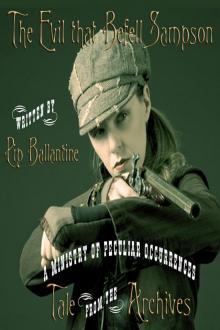 The Evil that Befell Sampson
The Evil that Befell Sampson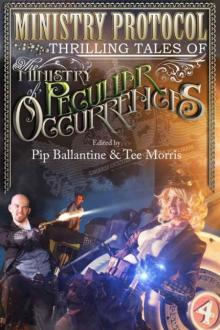 Thrilling Tales of the Ministry of Peculiar Occurrences
Thrilling Tales of the Ministry of Peculiar Occurrences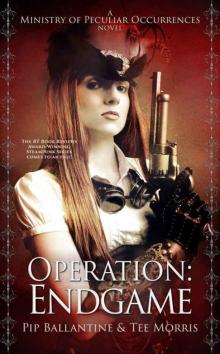 Operation: Endgame (Ministry of Peculiar Occurrences Book 6)
Operation: Endgame (Ministry of Peculiar Occurrences Book 6)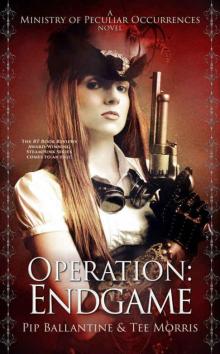 Operation_Endgame
Operation_Endgame The Curse of the Silver Pharaoh
The Curse of the Silver Pharaoh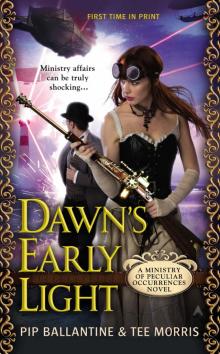 Dawn's Early Light
Dawn's Early Light The Mystery of Emerald Flame (Verity Fitzroy and the Ministry Seven Book 2)
The Mystery of Emerald Flame (Verity Fitzroy and the Ministry Seven Book 2) Magical Mechanications
Magical Mechanications